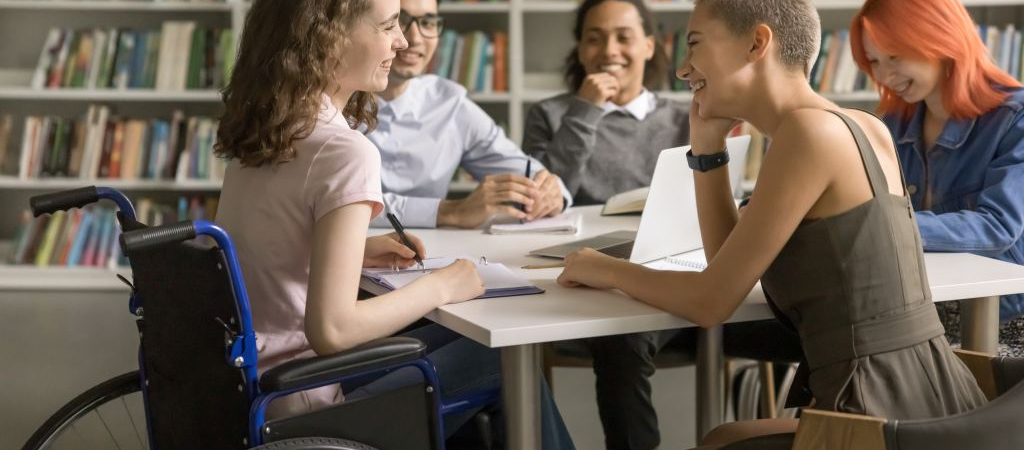Navigating college life can be both exhilarating and challenging — and the challenges may be compounded for individuals with disabilities. Fortunately, most colleges and universities are committed to being inclusive, offering a myriad of campus resources tailored to support students with diverse needs. Learn more about campus programs and resources that can help disabled students thrive academically and personally.
What Are the Rights of College Students with Disabilities?
College students with disabilities are entitled to certain rights and accommodations to ensure equal access to education. These rights are protected under the Americans with Disabilities Act (ADA) and Section 504 of the Rehabilitation Act. Some key rights include the right to reasonable accommodation, nondiscrimination, and equal opportunities in academic programs and extracurricular activities.
Additionally, students have the right to privacy regarding their disability status and related documentation. Institutions are required to work collaboratively with students to create an accessible and inclusive learning environment. While all U.S. institutions are required by law to meet the most basic ADA requirements, many colleges for students with disabilities go beyond the basic accommodation and offer robust programs to support students both academically and personally.
What Are Common Disabilities?
Disabilities can vary widely in their nature and impact; they can include visual or hearing impairments, speech and language impairments, chronic health conditions, cognitive disabilities, mental illness, mobility impairments, neurodiversity/learning differences, and physical disabilities. Colleges and universities must provide accommodation for a wide range of disabilities, including permitting service dogs on campus, allowing extra time for tests, making buildings accessible, providing assistive technology, and more.
Visually Impaired
Visual impairment refers to a condition where an individual experiences limitations in their ability to see, ranging from partial sight to total blindness. Visual impairments can be caused by various factors, including eye diseases, congenital conditions, injuries, or neurological disorders. The degree of visual impairment varies among individuals, and it significantly influences their daily activities, mobility, and access to information.
Under the ADA, colleges and universities must provide accommodation to visually impaired students, including:
- Accessible materials in Braille, large print, or electronic text compatible with screen readers.
- Assistive technology such as screen readers, magnification software, or refreshable Braille displays.
- Note-taking assistance including recorded lectures, assistive technology, and note-taking services.
- Physical accessibility, such as ramps, Braille markings, and clear pathways.
- Extended testing time to allow for potential challenges in reading and processing information.
Physical Disabilities
Physical disabilities encompass a range of conditions that impair a person’s mobility, dexterity, coordination, or stamina. These disabilities may be congenital, acquired through injury or illness, and can range from mild to severe. Individuals with physical disabilities may face challenges related to mobility, accessibility, and performing daily activities independently.
ADA-required accommodation for students with physical disabilities include:
- Wheelchair-accessible facilities featuring ramps, elevators, widened doorways, and restroom stalls.
- Assistive devices or software to enhance communication, mobility, or other functional abilities, such as adaptive keyboards or voice recognition software.
- Accessible parking close to entrances with proper signage and features.
- Flexible scheduling to accommodate medical appointments and other needs.
- Alternative methods for completing tasks and assignments.
Dyslexia
Dyslexia is a neurobiological condition that affects a person’s ability to read, spell, and write despite having average to above-average intelligence and receiving adequate instruction. It is characterized by difficulties in phonological processing, which can result in challenges related to decoding words, recognizing sight words, and understanding the relationships between sounds and letters.
Dyslexic students at college campuses may receive the following accommodation:
- Extended testing time to compensate for the slower reading and processing speed associated with dyslexia.
- Assistive tools like text-to-speech software, speech-to-text applications, and specialized fonts to help with reading and writing tasks.
- Note-taking support, such as providing lecture notes in advance, access to a note-taking assistant, or recording lectures.
- Alternative formats for textbooks and course materials, such as audiobooks and digital texts.
- Quiet testing environment to help with focus.
ADHD
Attention-Deficit/Hyperactivity Disorder (ADHD) is a neurodevelopmental disorder characterized by persistent patterns of inattention, hyperactivity, and impulsivity that can significantly impact daily functioning and development. Individuals with ADHD may struggle with tasks requiring sustained attention, organization, and impulse control.
Students with ADHD can expect accommodation to be made to help them overcome learning and executive function challenges, such as:
- Extended test-taking time to alleviate struggles with time management.
- Quiet or distraction-free environments to help students concentrate and perform at their best.
- Note-taking assistance to support those who may have difficulty focusing during lectures.
- Behavioral supports, such as a structured routine or designated space for breaks, to help manage impulsivity and hyperactivity.
- Alternative testing formats for students who have difficulty with traditional written exams.
Autism
Autism, or Autism Spectrum Disorder (ASD), is a neurodevelopmental disorder that may present challenges in social interaction, communication, and repetitive behaviors. ASD is a spectrum, meaning individuals with autism may vary widely in their abilities, strengths, and challenges. Some may have significant difficulties in communication and daily functioning, while others may have milder challenges.
ASD students are entitled to have reasonable accommodation on campus under the ADA. These include but are not limited to:
- Alternative communication methods, visual aids, or assistive technologies to enhance communication for those struggling with verbal expression or understanding social cues.
- Sensory accommodations, such as adjustments to lighting, noise levels, or providing sensory tools to help students manage sensory sensitivities.
- Extended time and/or a modified testing environment to reduce sensory distractions.
- Individualized instruction tailored to the student’s learning style and preferences.
- Flexible scheduling to accommodate students who need structured routines or who need to take breaks to manage sensory overload.
Cognitive Disabilities
Cognitive disabilities refer to conditions that impact cognitive functions, which include processes such as memory, attention, problem-solving, and language. A person with a cognitive disability may face challenges in learning, processing information, and interacting with their environment. Some common cognitive disabilities include traumatic brain injuries, intellectual disabilities, and certain neurodevelopmental disorders.
Common accommodations students with cognitive disabilities can find on campus include:
- Assistive tools and software that help with reading, writing, organization, or memory.
- Modified assignments to accommodate the student’s learning style or pace.
- Extended testing time to allow for processing speed or difficulties with time management.
- Note-taking service or allowing access to lecture notes to assist with information retention.
- Structured schedule to help with planning and organization.
Speech Disorders
Speech disorders refer to conditions that affect an individual’s ability to produce sounds, fluently articulate words, or communicate effectively. These disorders can take the form of articulation disorders (difficulty pronouncing sounds), fluency disorders (such as stuttering), and voice disorders (problems with pitch, volume, or quality).
Students with speech disorders can take advantage of these accommodations to help them learn and communicate more effectively in class:
- Alternative modes of communication, such as written responses or sign language interpreters.
- Assistive technology, such as speech-generating devices or communication apps.
- Extended time for oral assignments or presentations to allow students to communicate more comfortably.
- Flexible assessment methods, such as written assignments or projects, in lieu of oral assessments that can pose a challenge.
- Classroom modifications, such as seating arrangements or acoustics, to enhance communication for students with speech disorders.
Hearing Impairments
Hearing impairments refer to partial or complete loss of the ability to hear sounds. This can range from mild to profound, impacting the ability to perceive and understand auditory information. Causes of hearing impairments include genetics, aging, exposure to loud noise, infections, or injuries.
Per ADA requirements, hearing-impaired students have access to:
- Communication access services such as sign language interpreters and real-time captioning.
- Assistive listening devices to enhance sound clarity during lectures, presentations, or other events.
- Captioning and transcripts for videos and multimedia content used in classrooms.
- Written or visual materials as alternatives to auditory information, ensuring that hearing-impaired students have access to the same content.
- Seating arrangements that allow the student to better hear the speaker.
How Can Students with Hearing Impairments Succeed in College?
Students with hearing impairments can succeed in college with careful planning, effective communication strategies, and access to appropriate accommodations. Be proactive — connect with the college’s disability services office early in the admissions process to discuss your specific needs and to ensure that the appropriate accommodation is in place. Once you’re on campus, advocate for yourself by communicating your needs to professors, classmates, and relevant staff. Educate them on the most effective ways to communicate with you.
Connect with classmates, professors, and campus support services to build a strong support network. This network can help you stay informed about important information and provide assistance when needed. Join disability support groups or organizations on campus where you can connect with peers facing similar challenges, share experiences, and exchange advice on navigating college life with a hearing impairment. Most importantly, cultivate a positive mindset — embrace the uniqueness of your experience and celebrate your academic and personal achievements.
What Activities Are Good for Students with Learning Disabilities?
Students with learning disabilities can benefit from extracurricular activities that enhance their skills and help them overcome challenges. Joining clubs or organizations that cater to specific interests or hobbies can help students find a supportive community, feel a sense of belonging, and build social skills. Technology and coding clubs, for example, allow students to leverage their strengths in logical and analytical thinking. A speech or debate team can enhance communication and critical thinking skills and promote self-advocacy.
Participating in art, theater, or creative writing workshops can provide an outlet for self-expression and creativity, develop communication skills, and boost confidence. Engaging in community service or volunteer work demonstrates a commitment to social responsibility and allows students to develop interpersonal skills and work with others. Sports not only contribute to overall well-being, but team sports especially can help students learn teamwork and communication.
What Support Is Available for Students with Learning Disabilities at College?
Learning disabilities can affect each student differently, but they all face challenges when it comes to navigating the academic environment and achieving success. That’s why it’s so important for colleges to have a range of support services. However, students shouldn’t overlook resources that are available in the community surrounding campus.
Accommodations
All U.S. colleges and universities are required under the ADA to provide reasonable accommodation for students with learning disabilities through the disability services office. These may include extended test-taking time, note-taking support, alternative formats for course materials, assistive tools and software, tutoring, and structured study groups.
These accommodations may be enough to help many students, but others need additional support. Fortunately, hundreds of schools across the U.S. offer robust programs and services — typically for an additional fee — that provide students with counseling and mentoring, transition programs, life and job skills development, and more. The disability services office can connect you to additional programs and services on campus.
Community Resources
Community resources for students with learning disabilities can assist in various aspects of life, providing services, information, and opportunities.
- Local learning disabilities associations offer information, workshops, and support networks for people with disabilities and their families.
- Tutoring centers specializing in supporting students with learning disabilities may provide one-on-one assistance, academic coaching, and tailored learning plans to address specific challenges.
- Public libraries often offer resources such as books, audiobooks, and digital materials in accessible formats. Librarians can also help individuals find information related to learning disabilities and education.
- Vocational rehabilitation services and local employment agencies may help find suitable employment opportunities. These services can also offer job training and support for workplace accommodations.
- Local support groups bring together individuals with learning disabilities, their families, and professionals. These groups provide a platform for sharing experiences, exchanging information, and offering emotional support.
These are just a few of the resources you may find. You can also look for counseling services, community recreation programs, speech and language therapy centers, and legal advocacy services that support people with disabilities.
Campus Resources for Students with Learning Disabilities
Students with learning disabilities can find accommodation at any school, but the level of support can vary between institutions. Here are a few popular schools that offer specialized programs and support for undergraduate and graduate students.
University of California, Berkeley
The Disabled Students’ Program (DSP) at UC Berkeley offers a range of accommodations and support services, such as financial literacy education, individualized academic coaching, peer tutoring, career preparation, and more. Autism Spectrum services are available at no additional cost to provide academic support, social connections, and career readiness resources. Learn how to get into UC Berkeley.
University of Michigan
The Services for Students with Disabilities (SSD) office at the University of Michigan helps neurodivergent students make the most of their college experience through the Academic Support & Access Partnerships (ASAP) program. A variety of services are available, including academic coaching, peer-assisted study sessions, and workshops that assist with learning and executive function skills development.
University of North Carolina at Chapel Hill
The Learning Center at UNC offers ADHD and learning differences support services to help students succeed. Students can schedule one-on-one coaching appointments with learning disability specialists, join ADHD/LD workshops and groups, and participate in events. To receive classroom and testing accommodations, students must register with the Accessibility Resources & Service office.
University of Illinois at Urbana-Champaign
LD students at the University of Illinois can register for academic coaching and therapy services through the Disability Resources and Educational Services (DRES) office. Students work on developing time management, organization, goal setting, and academic skills during weekly coaching sessions. Individual and group therapy sessions and support groups are also available. DRES also offers career services to help prepare disabled students for the workforce.
University of Oregon
The Accessible Education Center (AEC) at the University of Oregon offers a variety of accommodations for students with disabilities. Students can attend support and social groups guided by group facilitators and join collaborative study spaces. The AEC also conducts workshops to help students with executive function skills, self-advocacy, and other challenges.
Transitioning to College Learning as a Student with Disabilities
The transition from high school to college can be particularly challenging for students with disabilities, but careful planning and self-advocacy can contribute to a successful and smooth transition. Explore transition programs or workshops offered by high schools or community organizations. These programs may provide valuable information about the differences between high school and college and strategies for success.
Parents of children with an Individualized Education Program (IEP) or a 504 Plan can request a transition meeting during the last year of high school to discuss how the plan will be implemented in the college setting. Students need to advocate for themselves once they are in college, so it’s important for them to know what type of support they can expect to receive once they are there. In addition to researching the accommodations, programs, and services offered by the college, review the policies and procedures related to the accommodations they offer. Understand deadlines for accommodation requests, documentation requirements, and the process for renewing accommodations each semester.
Resources & Tools for Students with Learning Disabilities
The disability services office at most colleges and universities can help students find additional resources and tools beyond campus. These might include websites and guides that help students learn better time management, books on learning strategies and study skills, and online communities and forums for people with learning disabilities. It’s also important for students to understand their legal rights and to have access to legal and advocacy resources when needed.
What School or University Parents Need to Choose for Autistic Students?
Choosing colleges for autistic students depends on where the student falls on the spectrum and how much support they need. Students who need additional support beyond the ADA requirements can benefit from fee-based programs offered by hundreds of schools, which are typically run by trained professionals who specialize in working with autistic students. Finally, there are two colleges that cater specifically to neurodivergent students, including those with ASD: Beacon College in Leesburg, Florida, and Landmark College in Putney, Vermont.
Finding best-fit colleges that meet your needs can be overwhelming. Fortunately, IvyWise offers research services that save you time as you start considering which schools to add to your list. Contact us to learn more.




